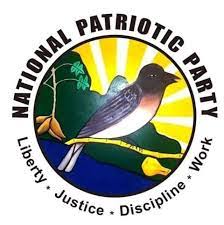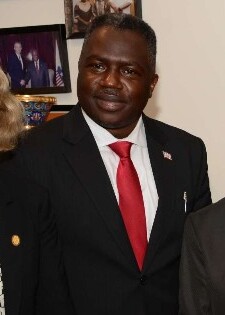
The Politics of Liberia takes place in a framework of a presidential representative democratic republic modeled on the government of the United States, whereby the President is the head of state and head of government; unlike the United States, however, Liberia is a unitary state as opposed to a federation and has a pluriform multi-party system rather than the two-party system that characterizes US politics. Executive power is exercised by the government. Legislative power is vested in both the government and the two chambers of the legislature.
Prince Yormie Johnson is a Liberian politician and former warlord who has served as a senator for Nimba County since 2006. A former rebel leader, Johnson played a prominent role in the First Liberian Civil War.

The National Patriotic Party (NPP) is a political party in Liberia. It was formed in 1997 by members of the National Patriotic Front of Liberia following the end of the First Liberian Civil War.

George Tawlon Manneh Oppong Ousman Weah is a Liberian politician and former professional footballer who served as the 25th president of Liberia from 2018 to 2024. Before his election for the presidency, Weah served as Senator from Montserrado County. He played as a striker in his prolific 18-year professional football career, which ended in 2003. Weah is the first African former professional footballer to become a head of state, and the only African Ballon d’Or and FIFA World footballer of the year winner in history. He won the African footballer of the year 3 times and is widely considered one of the greatest strikers of all time.

General elections were held in Liberia on 11 October 2005, with a runoff election for the presidency held on 8 November. The presidency and all seats in the House of Representatives and Senate were up for election. The elections were the first held since 1997 and marked the end of the political transition following the second civil war, having been stipulated in the Accra Comprehensive Peace Agreement of 2004. Ellen Johnson Sirleaf, former World Bank employee and Liberian finance minister, won the presidential contest and became the first democratically elected female African head of state in January 2006.

The Unity Party (UP) is a political party in Liberia that was started in 1984 by Edward B. Kesselly, also its first standard bearer. Officially founded in Buchanan, Grand Bassa County, the party was established on 27 July 1985. The Unity Party participated in the first elections after the 1980 coup, running against President Samuel Doe in October 1985. The party has remained active in Liberian politics since and is the current ruling party following the 2023 Liberian general election.

Joseph Nyumah Boakai is a Liberian politician who is the 26th and current president of Liberia. He previously served as the 29th vice president of Liberia from 2006 to 2018, under President Ellen Johnson Sirleaf and as the minister of agriculture from 1983 to 1985. Boakai ran for president in 2017, losing the election to George Weah. He went on to defeat Weah in the 2023 election.

General elections were held in Liberia on 11 October 2011, with a second round of the presidential election on 8 November. The presidency, as well as all seats in the House of Representatives and half of the seats in the Senate, were up for election. The election was overseen by the National Elections Commission (NEC).

The National Union for Democratic Progress (NUDP) was a political party in Liberia.

General elections were held in Liberia on 10 October 2017 to elect the President and House of Representatives. No candidate won a majority in the first round of the presidential vote, so the top two finishers – CDC standard-bearer Amb. George Weah and UP standard-bearer Vice President Joseph Boakai – competed in a run-off on 26 December. The second round was originally scheduled for 7 November, but was postponed after LP standard-bearer Cllr. Charles Brumskine, in third place, challenged the result in the Supreme Court. The Supreme Court dismissed the challenge, which would have forced a re-run of the first round had it been successful, and the second round was held on 26 December. Weah emerged victorious with 60% of the vote.
The All Liberian Party (ALP) is a political party in Liberia.

Gbehzohngar Milton Findley is a Liberian politician and businessman. He is a former President Pro Tempore of the Liberian Senate and also the Minister of Foreign Affairs in the administration of President Weah until 28 July 2020.

General elections were held in Liberia on 10 October 2023 to elect the President, House of Representatives and half of the Senate. Incumbent president George Weah was eligible for a second term. No candidate won a majority in the first round, with Weah narrowly placing first over opposition leader Joseph Boakai, which meant both advanced to a runoff held on 14 November 2023. Boakai defeated Weah by just over one percentage point in the closest runoff in Liberia's history, and Weah conceded the election peacefully.

This national electoral calendar for 2023 lists the national/federal elections held in 2023 in all sovereign states and their dependent territories. By-elections are excluded, though national referendums are included.
Events in the year 2023 in Liberia.

Jeremiah Kpan Koung is a Liberian politician who is the 31st and current vice president of Liberia. He served in the House of Representatives of Liberia from 2012 to 2020. He was elected to the Senate of Liberia in 2020. He became standard bearer of the Movement for Democracy and Reconstruction in 2022. In 2023, Joseph Boakai selected Koung as his running mate during his presidential run.
The Movement for Democracy and Reconstruction (MDR) is a political party in Liberia.
The Vision for Liberia Transformation (VOLT) is a political party in Liberia.
Events in the year 2024 in Liberia.
The Collaborating Political Parties (CPP) was a political alliance in Liberia. The alliance was originally formed in 2018 by four opposition political parties: the All Liberian Party (ALP), the Unity Party (UP), the Alternative National Congress (ANC), and the Liberty Party (LP). It was certified by the National Elections Commission (NEC) in 2020. By February 2022, the ALP and UP had withdrawn the alliance. By March 2022, a large faction of the LP had left as well. In April 2024, the CPP had officially dissolved.












